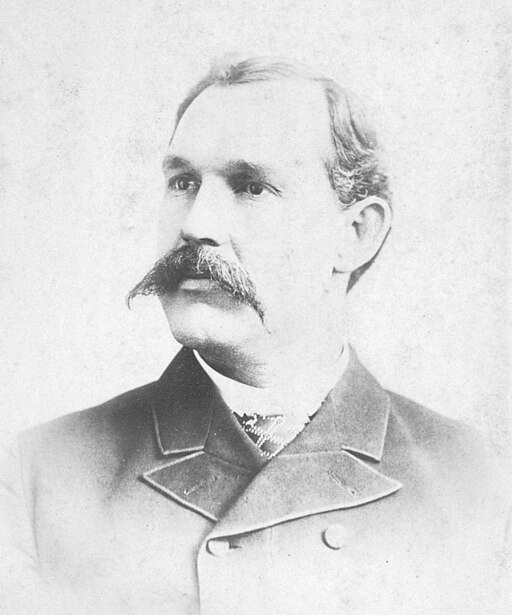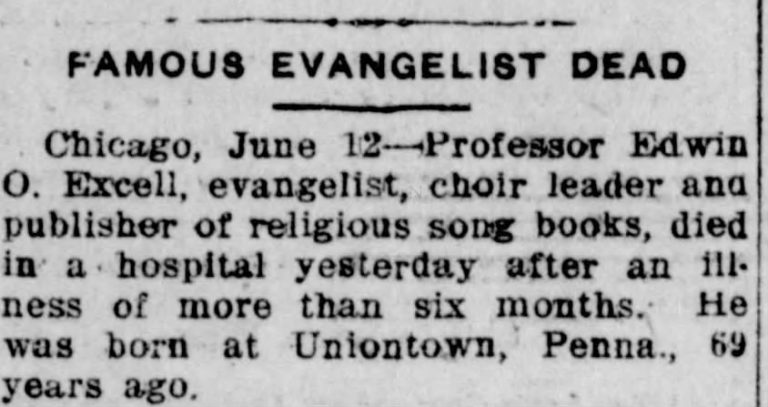Hymn History: Since I Have Been Redeemed
Author: Edwin Othello Excell
“It must be said of this hymn that it was the outgrowth of many tears, many heart-conflicts, and soul-yearnings, of which the world can know nothing. The history of many battles is behind it.”
(William Orcutt Cushing)
The Origins of the Hymn “Since I Have Been Redeemed”
Hymns often arise out of the lived experience of faith, carrying in their words the testimony of God’s grace. Among the many gospel songs that have endured through the years, “Since I Have Been Redeemed” stands out as a jubilant declaration of personal salvation. Written in the late nineteenth century, the hymn quickly became a favorite in revival services and church gatherings for its straightforward expression of joy in redemption. To understand its origins, it is helpful to look at both its author and the spiritual climate in which it was born.
The Author: Edwin Othello Excell
The words and music of “Since I Have Been Redeemed” were written by Edwin Othello Excell (1851–1921), better known as E.O. Excell. He was one of the most prolific and influential gospel songwriters and music publishers of his era. Born in Stark County, Ohio, Excell trained as a singer and developed a remarkable ability for leading large choirs. His voice and energy made him a sought-after song leader in revival campaigns, particularly in the meetings of the evangelist Sam P. Jones.
Excell was not only a performer but also a composer and publisher. Over the course of his career, he wrote or arranged more than 2,000 gospel songs. He compiled about fifty songbooks and contributed to nearly ninety more. His music was widely distributed through Sunday school songbooks and revival hymnals, making him one of the most widely heard church musicians of his day.
While many of Excell’s works were collaborations—he often set the texts of other writers to music—“Since I Have Been Redeemed” is one that he both authored and composed. It was first published in 1889 in Triumphant Songs, one of his collections intended for Sunday school and church use.
The Spiritual Climate of the Time
The late nineteenth century was a period of tremendous energy in American evangelical life. Revival meetings drew crowds numbering in the thousands, and gospel music was a central feature of these gatherings. Unlike older hymns with more formal structure and poetic style, gospel songs were written to be memorable, singable, and full of personal testimony.
“Since I Have Been Redeemed” reflects this style perfectly. Its verses are filled with simple yet powerful affirmations: the redeemed believer has a song, a Christ, a home prepared in heaven. Each stanza testifies to a blessing of salvation, while the refrain drives home the theme with jubilant repetition: “Since I have been redeemed, I will glory in His name.”
For revival audiences, this was precisely the kind of song that stirred both heart and voice. It was easy to learn, easy to sing in a crowd, and rich in joyful assurance.
The Message of the Hymn
At its heart, the hymn is a testimony hymn. Rather than speaking abstractly about redemption, it proclaims what it means for the individual believer. The recurring phrase “Since I have been redeemed” makes each line personal.
The hymn emphasizes three key themes:
- The Joy of Salvation – The believer has a song to sing, rooted in the experience of redemption. This reflects the biblical theme of the redeemed being given a new song (Psalm 40:3).
- The Person of Christ – The hymn centers not only on salvation as an event but also on Christ Himself, “my Savior, King.” It declares a personal relationship with Him as the foundation of faith.
- The Hope of Heaven – Looking ahead, the hymn points to a “home prepared,” echoing the words of Christ in John 14:2 about preparing a place for His followers.
By tying together the past (redemption accomplished), the present (a life of song and witness), and the future (the hope of heaven), the hymn encapsulates the full scope of Christian assurance.
Legacy and Influence
“Since I Have Been Redeemed” spread quickly through Excell’s songbooks and revival campaigns. Its popularity grew not only in the United States but also abroad as his collections were distributed in England and elsewhere. Many hymnals of the twentieth century included it, ensuring that generations of churchgoers became familiar with its words.
Excell himself would later gain fame as the arranger of “Amazing Grace” in the 1909 hymnal Coronation Hymns, which popularized the tune now most commonly associated with that hymn. But even apart from that achievement, songs like “Since I Have Been Redeemed” secured his reputation as a major figure in gospel hymnody.
The hymn’s enduring use testifies to the lasting power of a simple testimony song. Unlike theological treatises or poetic meditations, it communicates faith in the plain language of experience. For Christians, singing it is a way of joining their voices with countless others across the generations who have found joy in declaring what redemption means to them personally.
Conclusion
The origins of “Since I Have Been Redeemed” lie in the fertile ground of nineteenth-century revival music, shaped by the life and work of E.O. Excell. Born out of his dual gifts as a preacher in song and a skilled composer, the hymn has endured because it expresses something every believer longs to say: that redemption is not only a doctrine to believe but a reality to celebrate.
More than 130 years after its first publication, congregations still lift their voices with the same refrain: “Since I have been redeemed, I will glory in His name.” That is the heart of the hymn’s enduring appeal—a testimony that never grows old.
_____
Image Source/Credit (in order):
- Collins, Public domain, via Wikimedia Commons
- Newspapers.com, The St. John Standard, June 13, 1921, https://www.newspapers.com/article/the-st-john-standard/191521727/
Related
Sorry, no records were found. Please adjust your search criteria and try again.
Sorry, unable to load the Maps API.

